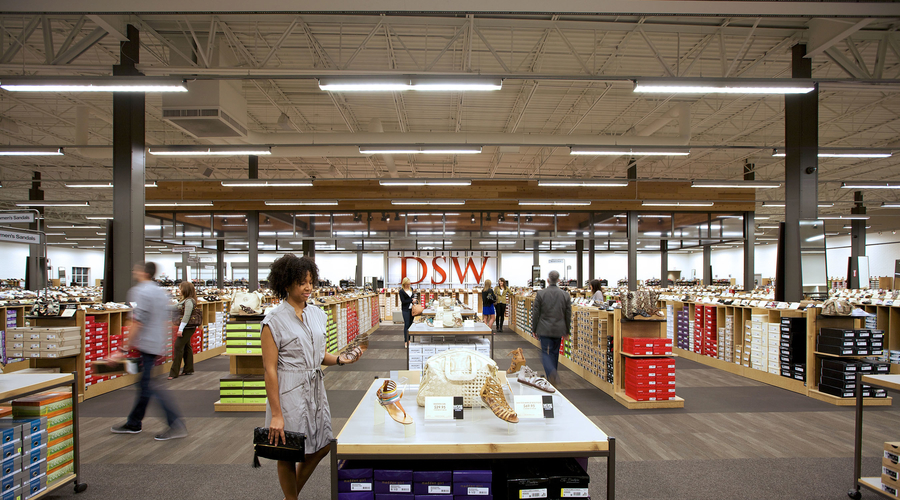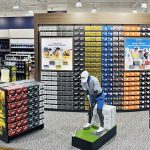Shares of DSW Inc. rose $1,88, or 8.1 percent, to $25.01 Tuesday after the off-price footwear chain posted its second consecutive quarter of strong comp and EPS growth. Earnings easily topped Wall Street’s targets and DSW lifted its annual guidance for second consecutive quarter.
Roger Rawlins, CEO, said that in 2018, DSW will have its strongest comp performance since 2011 and highest EPS since 2013. Said Rawlins, “As I compare our results for the retail landscape, I’m excited to see DSW Inc. at the top of the list both from a comp sales and profitability increase standpoint. Fiscal 2018 will be one of the best earnings growth years in our history.”
In the quarter ended November 3, earnings reached $39.3 million, or 48 cent a share, against earnings of $4 million, or 5 cents, a year ago.
On an adjusted basis, earnings rose 61.3 percent to $57.9 million, or 70 cents a share, from $35.9 million, or 45 cents, a year ago. Wall Street’s consensus estimate had been 53 cents.
Revenue increased 17.2 percent to $833 million. Comparable sales increased 7.3 percent. Wall Street expected revenues of $794.4 million on average.
Gross margins increased 320 basis points to 32.6 percent, due to favorable merchandise margin. The gains were driven by business mix and improvement in the DSW segment.
On an organic basis the DSW and ABG businesses gross margin improved 190 basis , CFO, “With our inventory discipline, improved sell-through and vendor accountability, we are committed to driving gross margin improvement on a sustainable basis.”
Q3 SG&A expenses increased 27 percent, driven by planned investments in marketing, increased bonus expectations and the acquisition of Canadian Retail segment. Reported operating expenses, as a percent of sales, increased 540 basis points to 27.2 percent, driven by planned marketing and labor investments, lease exit costs and acquisition-related costs.
Growth in gross profit dollars more than offset the SG&A growth delivering operating profit of 36 percent this quarter.
The 7.3 percent comp was led by a 8 percent increase in footwear, marking the sixth straight quarter in a row of positive comps.
Women’s footwear comped in the high-single-digits, men’s in the low-single-digits and accessories in the low-double-digits.
Said Poff, “Our strategy for growing the business for key product distortions continued, and kids and boot categories drove over 79 percent of the volume increase versus last year. Customer demand for fresh fashion drove our exceptional group business this quarter, which was the highest in three years.”
With kids in all stores or the first back-to-school season, the kids category delivered its highest kids’ volume quarter in company’s history, driven by increased locations and strong comps in doors that had kids’ product longer than one year. Said Poff, “high as 20 percent in its Canadian retail operations. Given these data points, we are confident we have room to significantly grow kids’ footwear at our DSW segment.”
Men’s footwear including athletic, had a second quarter in a row of positive comps as “we continue to focus on introducing fresh takes on dress and casual comfort,” said Poff.
Accessories continued its strong performance producing double-digit comps with strong regular priced selling. Increased depth in hosiery and handbags are driving the business.
Poff said its marketing strategies, led by digital marketing and VIP Rewards relaunch, continued to drive strong traffic and conversion online and offline. Increasing digital marketing spend drove a lift in traffic and new customer acquisitions. The VIP relaunch, introduced in Q2, launched additional perks this quarter, including real-time points and rewards accumulation, the ability to donate rewards to DSW’s nonprofit partners, and the ability to earn points for engaging with the brand by trying on shoes, filling out customer profiles, or watching online videos.
Said Poff, “These features offer our customers more convenience and create a stronger emotional connection with our brand.”
Poff said DSW went through its first quarter under its new operating model in all stores, which improved customer experience in two ways. Frist, it provided role clarity between customer-facing and store execution teams. Second, the change provides sales coverage and better alignment of payroll hours to peak traffic pattern. Said Poff, “We will continue to refine this new operating model as we provide continuous improvements to our customer experience.”
DSW’s Canadian retail segment and Other Business segment also delivered strong performances this quarter.
The Canadian retail segment generated $80 million in sales this quarter, with $8 million coming from the ongoing exit of the Town Shoes banner. The Shoe Company, Shoe Warehouse, and DSW Canada banners drove high single-digit comp growth in the quarter and earnings contribution of 7 cents. Poff said it reached $10 to $15 million of annual operating income target.
Third quarter, due to back-to-school volume, is the highest-volume quarter for these family footwear brands. Our leadership’s focus on the Shoe Company, Shoe Warehouse, and DSW Canada banner drove high single-digit comp growth and earnings of $0.07 to our Q3 adjusted EPS.
The Other Business segment’s sales fell to $30 million rom $54 million last year due to the exit of Ebuys and Gordmans. The ABG business, which operates footwear departments in Stein Mart, continued its strong momentum with a 7 percent comp this quarter. The ABG business ended the quarter with 287 locations.
On the exit of Town Shoes, Poff said total expenses to exit the leases will be approximately $20 million, $13 million of which was incurred in Q3 and the balance in Q4.
On the acquisition of Camuto Group, Poff said capital constraints presented by Camuto’s failed expansion into retail and its move to bring on a new distribution center during their busiest time of the year presented a buying opportunity for the business. Having been burned by several industry bankruptcies, including Nine West and Rockport, Camutos factory partners has begun to “dramatically pull back on capacity.”
DSW partnered with Authentic Brands Group (ABG) on the acquisition with ABG securing the several intellectual property rights. Total consideration paid to the Camuto Group was approximately $341 million. DSW will be responsible for approximately $238 million of the purchase price.
For DSW, Camuto will significantly ramp up the company’s efforts to develop its own design and production capabilities. Said Poff, “While we will remain a house of brand, we will accelerate the growth of our exclusive brands which will enable us to gain greater control of our product destiny and exert greater leverage with the vendor community.
DSW’s guidance assumes the acquisition will be dilutive by 5 cents to 10 cents a share to the fourth quarter. Their fourth quarter is one of their weakest quarters from a sales and operating income performance. For 2018, Camuto Group is projecting a loss of approximately $10 million before tax, including $9 million of interest expense.
Rawlins said the objective for the year for the core business was the gain market share and DSW will become a $3 billion retail business in 2018. With a full year of the Canadian Retail segment and Camuto Group’s wholesale business, DSW will be “well on our way” to $4 billion in annual revenue, which includes approximately $500 million from Camuto. The wholesale and private label business represents approximately $1 billion in downstream retail sales, thus giving DSW Inc. the ability to participate in close to $5 billion of footwear market share.
Rawlins said that from 2011 to 2018, DSW drove $1 billion of top-line growth with approximately $1 billion investment in over 200 store build-outs, operating costs and inventory. During taht timeframe, “modest market share” was captured as pure play e-commerce companies and brands going direct-to-consumers gained significant market share.
The acquisitions made over the past 6six months have added more market share than the $1 billion investment made over the past six years. Added Rawlins, “And we’ll transform our company into the most disruptive force in the industry, while enabling us to grow well into the future.”
For the current year, DSW raised its full year outlook for adjusted EPS in the range of $1.70 to $1.85 per share, compared to a range of $1.60 to $1.75 previously. Total revenues are now expected to expand in the range of 12 to 14 percent, up from a range of 6 to 9 percent previously. Comps are expected to climb in the mid- to high-single digit range, up from low- to mid-single digit range previously.
Image courtesy DSW
















